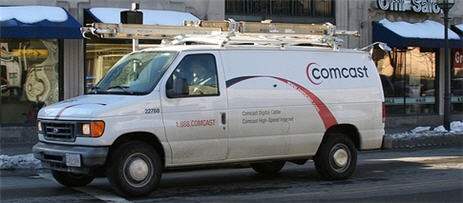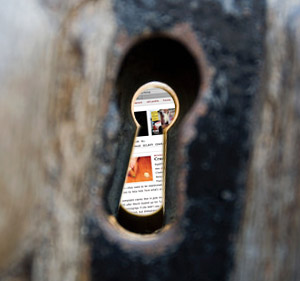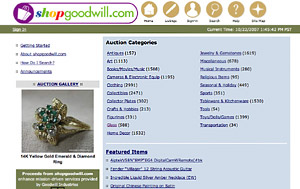A study released this week (just in time for the FTC’s online advertising workshop) shows that a huge percentage of Americans don’t grasp just how intensively their online habits are tracked, analyzed, and used to serve ads back to them. Almost 55% of respondents “falsely assumed that a company’s privacy polices prohibited it from sharing their addresses and purchases with affiliated companies,” and almost 40% “falsely believed that a company’s privacy policy prohibits it from using information to analyze an individuals’ activities online.”
internet

Consumer Groups Ask FCC To Ban Comcast From Blocking Any Peer-To-Peer Activity
Advocacy groups and legal scholars filed a network neutrality complaint with the FCC today against Comcast, asking the government to issue a temporary injunction against the cable company that forces it to “stop degrading any applications. Upon deciding the merits, the Commission should issue a permanent injunction ending Comcast’s discrimination.” More importantly, the complaint asks the FCC to classify any blocking of peer-to-peer file sharing as a violation of the agency’s Internet Policy Statement, “four principles issued in 2005 that are supposed to ‘guarantee consumers competition among providers and access to all content, applications and services.'”

AOL Announces It Will Let Users Block Targeted Ads
On the same day that consumer groups called for “Do Not Track” lists to preserve consumer privacy, AOL pre-emptively announced a new service that they say will let users opt out of receiving targeted ads. “Choosing to opt out sends a cookie to a user’s computer that blocks the ads from appearing. AOL’s system prevents the deletion of the opt-out cookie.”

Should There Be A "Do Not Track" List For Internet Users?
Several consumer groups have joined together to request that the FTC implement a “Do Not Track” list for online use, which would allow Internet users to request that they be told in advance any time their online patterns are being tracked for advertising purposes. They submitted a formal request today, before the FTC’s 2-day workshop begins tomorrow where it will “study the increasing use of tracking technology to target online ads.”

Woman Exploited Bug On QVC Website To Steal Over $400k In Merchandise
A North Carolina woman named Quantina Moore-Perry pleaded guilty to wire fraud last week for stealing $412,000 worth of merchandise from television retailer QVC in 2005. She discovered and exploited a bug in QVC’s online ordering system, where she would still receive the merchandise without being charged if she canceled the order immediately after placing it. She would then sell the items on eBay.

Security Firm Says Hackers Can Access Vonage Calls
It’s not a good week for Vonage. VoIP Security firm Sipera has announced that they’ve discovered a vulnerability in Vonage’s equipment that can allow hackers to take control of user accounts to intercept calls, make calls via the accounts, eavesdrop, or launch DoS attacks. Although most VoIP systems are about as secure as sending IM messages over a public wifi network (that is, not secure at all), Vonage has a couple of special problems with its Motorola adapters not authorizing requests, which leaves a special door open for bad people doing bad things. The problem also affects adapters from Grandstream and Globe7.

U.S. Retailers And Police Ask Online Sellers To Help Fight Theft
The retail industry claims it loses $30 billion a year from organized retail crime—rings of professional shoplifters who sell their goods at flea markets, pawn shops, and online through auction sites like eBay—so they’re asking online sellers to help by posting serial numbers of products and by providing more information on high-volume sellers. Right now all they can do is ask, but there are politicians in Washington who are making noises about pursuing a legislative solution.

Biz Columnist Changes His Mind, Now Says "Carriers Need Regulation"
You know telecoms are behaving badly when a business columnist who just a year ago argued for a hands-off government approach has reversed his opinion. “I’ve changed my mind,” he writes. “The behavior of the top telecommunications companies, especially Verizon Communications and AT&T, has convinced me that more government involvement is needed to keep communications free of corporate interference.”

Comcast: "We Throttle Traffic To Help Other Users; Besides, It's Not Permanent"
Comcast is in heavy PR-spin mode this week following last week’s reports that they spoof customers’ computers to cancel peer-to-peer connections, and have been blocking corporate users from sending large attachments via Lotus Notes (that blockage was “fixed” last week, around the time this story broke). Comcast says that they don’t “block” anything but rather delay requests, and that it’s only done to improve overall performance for their customers.

iPhone Security Is On Par With Windows 95
We owe Apple an apology, because it turns out they weren’t kidding when they said that opening the iPhone up to 3rd party software was just asking for trouble. That’s because the iPhone runs every single app as “root,” which is computerese for “more power than Steve Jobs.” It was this root access that made the Safari exploit possible back in July, and it can’t be fixed without a complete redesign of the firmware.

Verizon To Pay $1 Million To Customers After Falsely Advertising Data Plans As "Unlimited"
According to NY Attorney General Andrew Cuomo, Verizon Wireless has agreed to reimburse $1 million to customers for wrongful account termination after falsely advertising their wireless plans as “unlimited,” when in fact the company sets limits and terminates the accounts of heavy users.

Comcast Impersonates Users' Computers To Meddle With Internet Traffic
Comcast uses its own computers to masquerade as those of its users in order to disrupt and throttle internet traffic—specifically the peer-to-peer kind—whenever it chooses, according to nationwide independent tests carried out by the Associated Press. A Comcast rep dances around the charge by saying that the company doesn’t “block” access to anything—but he makes no mention of throttling or disrupting connections to shape traffic, probably because if he did, he’d have to admit to it or blatantly lie.

Why I Canceled Comcast
Reader “Mr. Pants” writes us with the story of why he canceled Comcast. It’s all the reasons that everyone cancels Comcast wrapped up into one spiffy complaint letter.

Congress Asks FCC To Accurately Count U.S. Broadband Homes
Congress has added its voice to the growing number of critics who have noted that the FCC is misreporting broadband penetration in the U.S. According to eWeek, last Wednesday a House subcommittee “approved legislation to change the Federal Communications Commission’s methodology for determining deployment.” The FCC currently counts a single home in a zip code as representative of the full zip code—so one home having broadband access is considered the same as every home in that area having broadband access. By doing this, they inflate the number of homes with broadband access and present a picture of increased “natural” competition in the market, which is then used by telecoms and lobbyists to argue against policy decisions that don’t favor existing corporations.

3 Ways To Improve Your Online Shopping Experience
SmartMoney offers three tips to improve some of the most common down-sides of shopping online: too many results, not enough discounts, and dreaded shipping fees.

6 Online Shopping Scams To Watch Out For
1. Missing Auction Goods – Auction fraud represents over a third of Internet scam complaints every year. Your safest bet is to pay with plastic so you gain the protections of the Fair Credit Billing Act. When plastic’s not an option, setting up an account through PayPal or BillPay that connects to your credit card is the next best bet.

eBay Hacked, User Accounts Disabled, No Personal Information Compromised
eBay has been hacked, says Ars Technica, and several members have had their accounts disabled. eBay’s Trust and Safety team issued a statement in which they said (adorably) that the hacker was “a known fraudster to us.”



